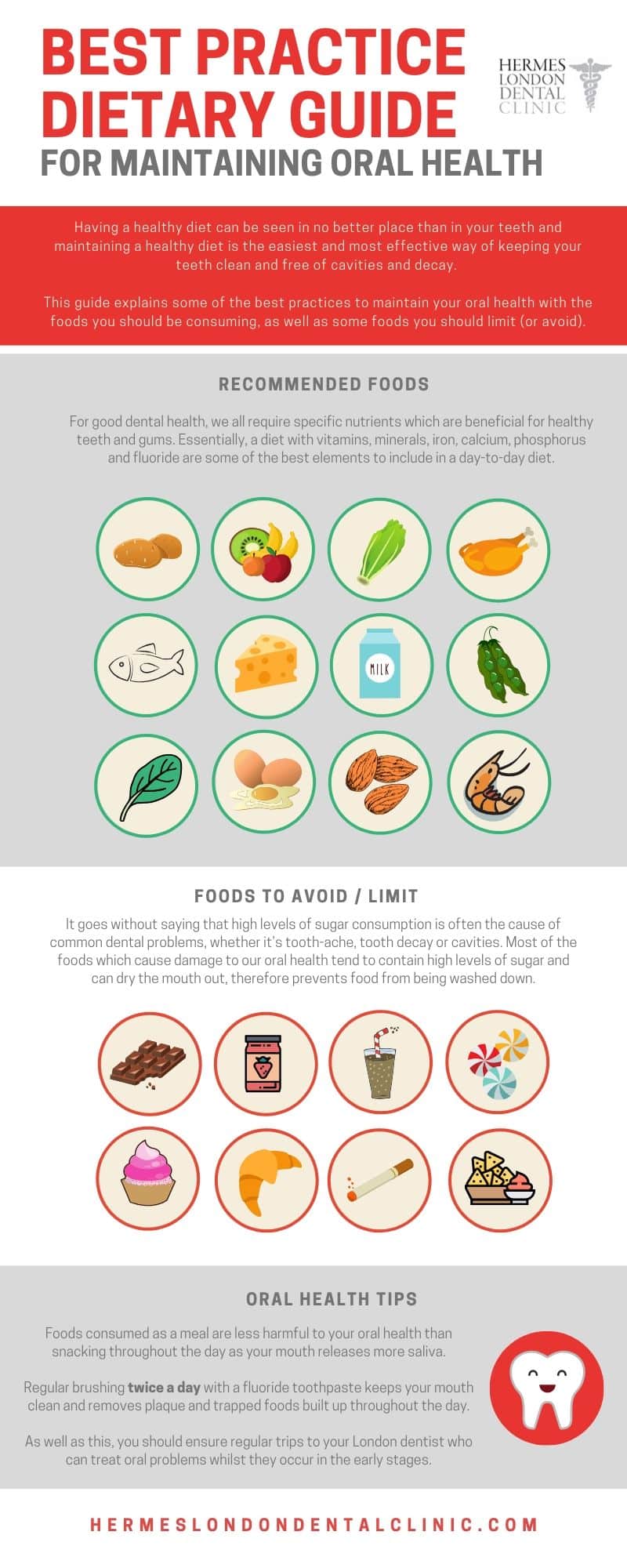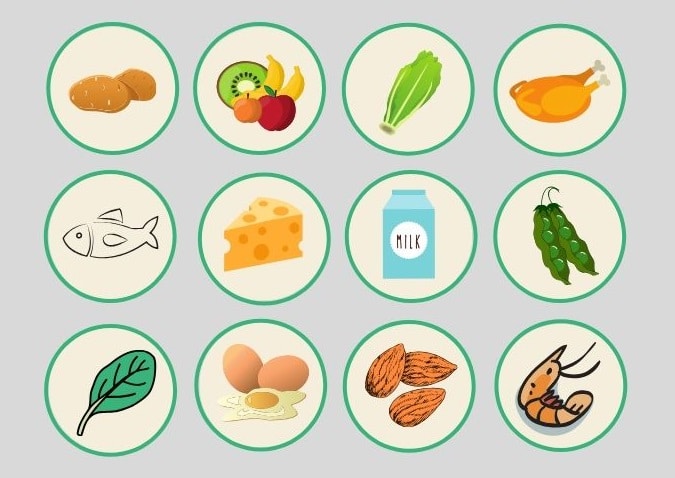
The foods you choose and how often you consume them is proven to have an effect on the health of your teeth and gums along with your general health. Understanding what you should avoid, limit and incorporate into your diet more often to improve your oral health has never been more important.
Prevention is always better than the cure, and whilst there are dental treatments which can improve the structure, health and appearance of your teeth, having a healthy diet is the most effective. Some dental diseases including tooth decay are caused by diets with high levels of sugar, however similar to most oral health conditions, this is largely preventable.
This best practice dietary guide explains the best food groups to consume in order to protect your teeth from the risks of some of the common dental diseases.
Recommended foods
For good dental health, we all require specific nutrients which are beneficial for healthy teeth and gums. Essentially, a diet with vitamins, minerals, iron, calcium, phosphorus and fluoride are some of the best elements to include in a day-to-day diet.
Whole grains
Whole grains, including high-fibre carbohydrates, contain magnesium which are key to healthy bones and teeth. Whole grains also provide essential B vitamins and irons to keep the gums healthy. When eating starchy foods, such as potatoes, pasta, rice or bread, it’s recommended to opt for whole grain versions instead.
Fruits
Nutrients found in fruit keep us healthy and allow us to fight off diseases, which includes gum disease. Fruits do contain large amounts of natural sugars, so it’s worth consuming in moderation. With that being said, a healthy piece of fruit is always a better alternative than sweets or chocolate.
Vegetables
Vegetables are full of vitamins and minerals whilst remaining low in calories. Leafy greens, such as kale, lettuce and spinach are high in calcium and promote oral health by building the enamel of your teeth. Whilst leafy greens provide a multitude of health benefits, spinach is thought to have the benefit of preventing cavities and gum disease.
Lean protein
Lean sources of protein, such as meat, fish, eggs, beans and milk contain phosphorus which is an essential mineral which protects the protective enamel layer surrounding your teeth. Protein is needed in your diet to build and repair tissues, whilst phosphorus is needed to strengthen the teeth.
Dairy
Cheese is known as a saliva maker which supports the teeth by fighting germs in your mouth and preventing bad breath. Whilst cheese and milk both contain calcium, they help provide minerals needed by the teeth, that otherwise would have been lost because of other foods we eat. Similar to cheese, yoghurt contains high levels of calcium, protein and probiotics which reduce the level of bacteria in the mouth. Some yoghurts contain high amounts of sugar, so choosing a plain yoghurt with no added sugar is advised.
Fluoride foods
Whilst many of us think of toothpaste when we talk about fluoride, it’s a natural mineral that is also found in several natural foods. Fluoride helps prevent tooth decay and can be found in black tea, seafood (including shrimp and crab), wine, coffee, raisins, powdered cereals and tap water.
Fibre
Fibre gets the saliva in our mouths flowing, making it one of the best natural defences against gum disease and cavities. High-fibre foods cleanse the tooth surfaces to remove the build-up of plaque, whilst also hinder the process of oral bacteria growing in the mouth. Some of the best high-fibre foods include seeds, nuts, whole grains, vegetables, fruit and beans.
Chewing gum
This might seem like a surprise to some, but chewing gum produces a great amount of saliva which removes stuck food particles from the mouth. Standard chewing gum contains high amounts of sugar, so it’s worth opting for sugar-free chewing gum.
Foods to avoid / limit
It goes without saying that high levels of sugar consumption is often the cause of common dental problems, whether it’s tooth-ache, tooth decay or cavities. Tooth decay is the single most common chronic disease found in children, although this is preventable.
Some of the most disastrous foods and drinks contain sugar, however, sugar appears in more supermarket products than most of us expect. These sugars are found in sweets, chocolate, cake, biscuits, soft drinks, alcohol, fruit juice, pastries, jams, syrups, ice cream, dried fruit and sauces.
Other foods to avoid include some starchy foods which contain carbohydrates which break down into sugars and can linger in your mouth for long periods. Starchy foods such as crisps and soft breads can become trapped between your teeth and increase the chances of developing dental cavities and decay. Opting for starchy foods without white flour can make some difference.
Also be sure to avoid any substances which can very easily dry out the mouth as saliva is useful for keeping your mouth healthy. Common substances include medicines, alcohol, tobacco and salty foods.
Top dental tips for oral health
It’s been proven that foods consumed as a meal are less harmful to your oral health than snacking throughout the day. When eating a meal, your mouth releases more saliva which helps to wash foods down and reduce the acids in the mouth.
Brushing your teeth twice a day is the best way to practice good oral hygiene and should be seen as part of your daily routine. Regular brushing with a fluoride toothpaste keeps your mouth clean and removes plaque and trapped foods that have built up throughout the day.
As well as this, you should ensure regular trips to your London dentist who can treat oral problems whilst they occur in the early stages.
If you require an emergency dentist in Victoria, contact us on 020 7233 7660. Our dentists will see all emergency patients on the same day whenever possible, and you will be offered the next available appointment as soon as you call.
To Download The Featured Infographic, Click Here.
- GERD and Your Teeth: Why you should see a dentist urgently - November 24, 2024
- When a broken tooth is considered a dental emergency - November 24, 2024
- How to prevent tooth decay in children - July 9, 2024



